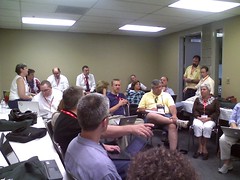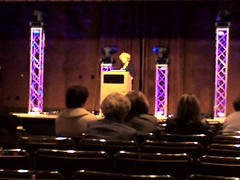 My Dad would say, “You’re in High Cotton, son!” Snap, and I’ve left Greensboro, North Carolina, and landed at The Broadmoor Hotel near Colorado Springs. It was late when I got here last night and still dark this morning, so I haven’t seen the place from the outside. But this is the first hotel room where the first thing I wanted to do when I walked in was pull out my camera and take a picture (see at the right). It’s not my style, but I’m impressed.
My Dad would say, “You’re in High Cotton, son!” Snap, and I’ve left Greensboro, North Carolina, and landed at The Broadmoor Hotel near Colorado Springs. It was late when I got here last night and still dark this morning, so I haven’t seen the place from the outside. But this is the first hotel room where the first thing I wanted to do when I walked in was pull out my camera and take a picture (see at the right). It’s not my style, but I’m impressed.
I’ll be speaking to the Colorado Association of School Boards today and then going home tomorrow morning, for a couple of days. But while I was flying west, a conversation I had at NCETC haunted me.
First, I want to say, I am certain that the two people I’ll be referring to a good, caring, talented educators, with the very best intentions at heart. I feel a bit uncomfortable and even sneaky reporting on the conversation here, but I am pretty sure that this is important — either in terms of my objections or in terms of finding, from you, that I’m wrong.
It was a teacher and a principal of an elementary school in a rural county of North Carolina. I asked my usual question, “What’s knocked your socks off?” The young one, the teacher, 4 years experience, started telling me about a web service that they are excited about. She was practically bubbling. I listened. Then she described an online assessment service that was tied directly to the North Carolina standards, and that it would enable the teachers to frequently test their students’ mastery of specific standards, evaluate their strategies, and adapt.
Now normally, I’m losing interest at this point, but she was so excited, I have to say it was contagious. My skeptic antenna stayed put, and I started proding with questions. The principal, then, described the assessment tool that they were currently using, and how it worked, and I interrupted. “So how good has your current assessment tool been at predicting performance on the state’s End of Grade test?
She looked at me, and said, “Terrible!” She said, we were so excited and proud, and proud of our students, when testing time came, because they were doing so well with the assessments. But then, the test scores came back and they were very bad (don’t recall the descriptive word she used). This is why they are so excited about the new tool, that seems better aligned with the style of the NC tests.
OK, most of the readers here know where I’m going with this, so there’s no need to elaborate. But as we were climbing to our cruising altitude last night, approaching the Appalachian mountains, I thought, we’re trying to paint the clouds. Our kids are not a picket fence with identical rails you can paint. They’re all different, they all have different strengths and weaknesses, talents and challenges, surfaces and depths — and they’ll all need to know different things for their futures, futures we can’t even describe. Certainly they need to learn certain basic literacy skills (which we’re still trying to redefine). And we need to be sure these skills are attained.
 But when we teach kids how to pass tests, we’re trying to paint a picture on to something that just want hold it. Looking out to the west, and seeing the setting sun shine through the ubiquitous clouds of the Smokies, I felt that this is how to get your picture. Not by painting the clouds, but by showing the sun shine through the clouds. Empower learners to surprise you with their brilliance.
But when we teach kids how to pass tests, we’re trying to paint a picture on to something that just want hold it. Looking out to the west, and seeing the setting sun shine through the ubiquitous clouds of the Smokies, I felt that this is how to get your picture. Not by painting the clouds, but by showing the sun shine through the clouds. Empower learners to surprise you with their brilliance.
And, perhaps even more important, what did those children think, when they’d been so successful with the schools assessment practices, only to fail the state test. What do schools mean to these children. How long will they stay in those schools?
2¢ Worth!
Image Citation:
Sparrow, Tom. “Flying Sunset.” Tomsparrow’s Photostream. 11 Sep 2007. 30 Nov 2007 <http://flickr.com/photos/spidge/1360010165/>.

 Before I get to the point of that title, I have to say something about the great day I had, yesterday, delivering four presentations: video games, wikis, a new session about SecondLife, and a featured address about the future, our kids, our information environment, and flat classrooms. It was a great day because I had so many opportunities to engage in conversations about barriers and leverage points to pry those barriers away. Conference planners sometimes seem surprised when I say that I want to do follow-up sessions. It’s through interactions with educators and education leaders that I learn, that I get my ideas tested, stretched, and refined.
Before I get to the point of that title, I have to say something about the great day I had, yesterday, delivering four presentations: video games, wikis, a new session about SecondLife, and a featured address about the future, our kids, our information environment, and flat classrooms. It was a great day because I had so many opportunities to engage in conversations about barriers and leverage points to pry those barriers away. Conference planners sometimes seem surprised when I say that I want to do follow-up sessions. It’s through interactions with educators and education leaders that I learn, that I get my ideas tested, stretched, and refined. It’s the 20th
It’s the 20th 




 Working here, and testing some of the components of the online handouts I’ll use for one of my presentations, I discovered something new at
Working here, and testing some of the components of the online handouts I’ll use for one of my presentations, I discovered something new at  Jeff Utecht’s quite unique mind is at it again. Reading through his Men’s Health magazine, he ran across a Honda ad that spoke to him not just about motorcycles. You see, Jeff had also been navigating his aggregator. So lots of education related ideas were also intermingling with two-wheeled transport and advertizing. The result was a quite clever add for School 2.0. Click it here to view the version he posted on his
Jeff Utecht’s quite unique mind is at it again. Reading through his Men’s Health magazine, he ran across a Honda ad that spoke to him not just about motorcycles. You see, Jeff had also been navigating his aggregator. So lots of education related ideas were also intermingling with two-wheeled transport and advertizing. The result was a quite clever add for School 2.0. Click it here to view the version he posted on his 